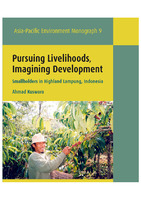Pursuing Livelihoods, Imagining Development Smallholders in Highland Lampung, Indonesia
Abstract
This monograph explores the ways in which people experience ‘development’ and how development shapes and maintains their lives. The discussion begins with Lampung Province, moves to one of the province’s highland regions, and ends in a village in this highland region. Colonial and post-colonial initiatives drove the transformation of Lampung in the twentieth century bringing mixed results and effects including rapid growth in agricultural production, the formation of ‘wealthy zones’ in some areas, and the creation of pockets of poverty in other areas. In Sumber Jaya and the highlands of Way Tenong, migrants have transformed one of Lampung’s last frontier regions into one of its ‘wealthy zones’. Although the bulk of these migrants migrated spontaneously, they were integrated within the framework of planned development. The level of progress that the region has achieved is largely the result of villagers’ efforts to bring state resources to the village. In conflict with forestry authorities for decades, farmers in some villages have agreed to establish a new relationship with authorities, but the struggle for control over land resources continues.
Keywords
indonesia; development; Bengkulu language; Coffee; Java; Lampung; Paddy field; Rice; Transmigration program; VillageDOI
10.26530/OAPEN_469192OCN
982179690Publisher
ANU PressPublisher website
https://press.anu.edu.au/Publication date and place
2014Classification
Development studies


 Download
Download Web Shop
Web Shop